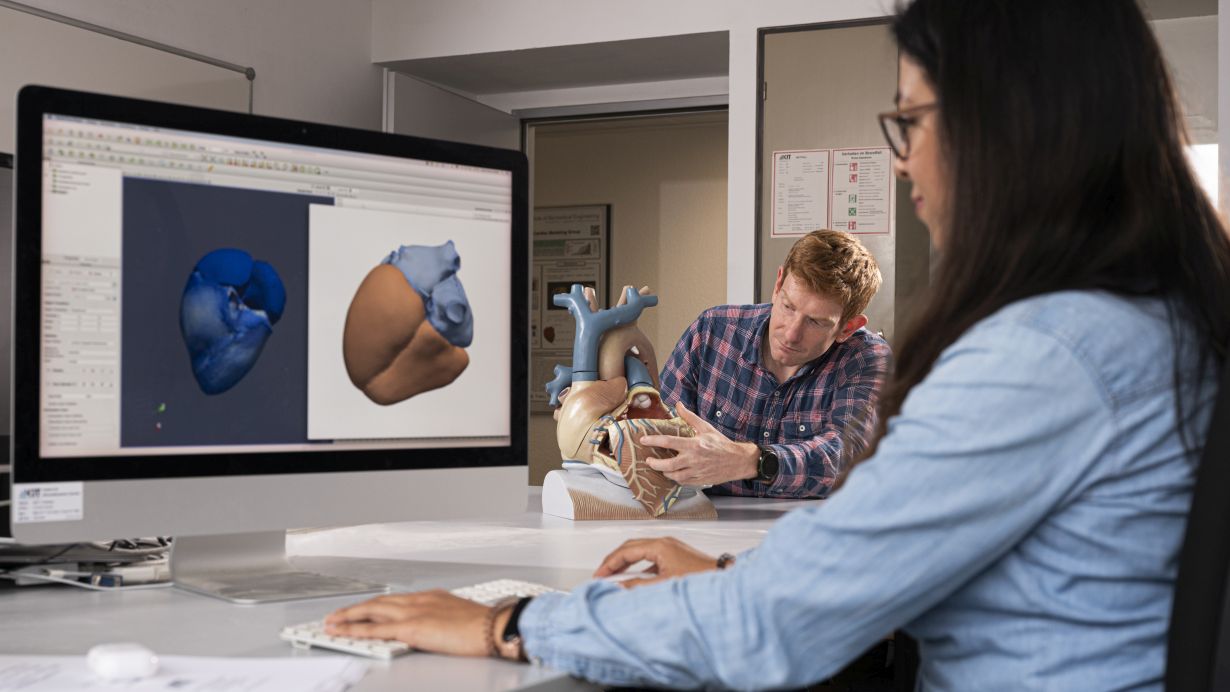
Digitalization does not only affect private life and work, but also influences and changes the entire healthcare sector. Sustainable progress in medical technology to preserve health will require increased collaboration of citizens, physicians, and researchers in future. To push this transformation process, the KIT Center of Health Technologies (KITHealthTech) has now been established at Karlsruhe Institute of Technology (KIT). Its mission consists in developing from the society's perspective digital and technological solutions for medical products. Work will focus on the society's needs and benefit.
Thanks to e-health, telemedicine, and wearables, the point of care will increasingly shift from general practitioners and hospitals to patients at home. This will require new, digital, and innovative technologies and infrastructures. The new KIT Center of Health Technologies pools the work of more than 150 scientists from a large range of disciplines, including medical engineering, additive manufacture, robotics, life sciences, and data sciences. Their goal is to accelerate research in this area.
"With this new Center, we respond to the needs of the population and healthcare sector. Continuous change in e.g. digitalization or robotics results in many new opportunities for us," says the President of KIT, Professor Holger Hanselka. "The vast competencies of our researchers help overcome the borders of disciplines and shape, develop, and establish tomorrow's healthcare."
"The wide range of expertise and numerous activities at KIT are the basis for coordinated health technologies research," says Professor Oliver Kraft, KIT's Vice President Research. "In particular, we plan to combine fundamental research in various areas with applications in health technologies. In this way, we address the needs of an aging society and additionally offer modern and new research-based study programs."
Interdisciplinary Cooperation Pushes Research
"To develop successful digital and technological solutions for future global challenges in the healthcare sector, we will need comprehensive technological and social competencies. We cooperate closely with hospital networks, health insurance companies, and licensing authorities," says Professor Andrea Robitzki, the Division Head responsible for the KIT Center of Health Technologies. "It is our vision that citizens in the region of Karlsruhe directly interact with physicians, hospitals, and other players in the healthcare sector. In this way, we want to create a unique ecosystem."
Researchers from nearly all Centers, Divisions, and Departments of KIT contribute their interdisciplinary expertise to three thematic fields: Technology for precision medicine, holistic and individualized patient care, and digital health. Work covers humanoid robotics, exoskeletons, accelerator technologies for radiation diagnosis systems, biomaterials, precision medicine for personalized therapy, cybersecurity for the protection of health data, and digital health.
Further Information: https://www.healthtech.kit.edu/
Being "The Research University in the Helmholtz Association", KIT creates and imparts knowledge for the society and the environment. It is the objective to make significant contributions to the global challenges in the fields of energy, mobility, and information. For this, about 9,800 employees cooperate in a broad range of disciplines in natural sciences, engineering sciences, economics, and the humanities and social sciences. KIT prepares its 22,300 students for responsible tasks in society, industry, and science by offering research-based study programs. Innovation efforts at KIT build a bridge between important scientific findings and their application for the benefit of society, economic prosperity, and the preservation of our natural basis of life. KIT is one of the German universities of excellence.






